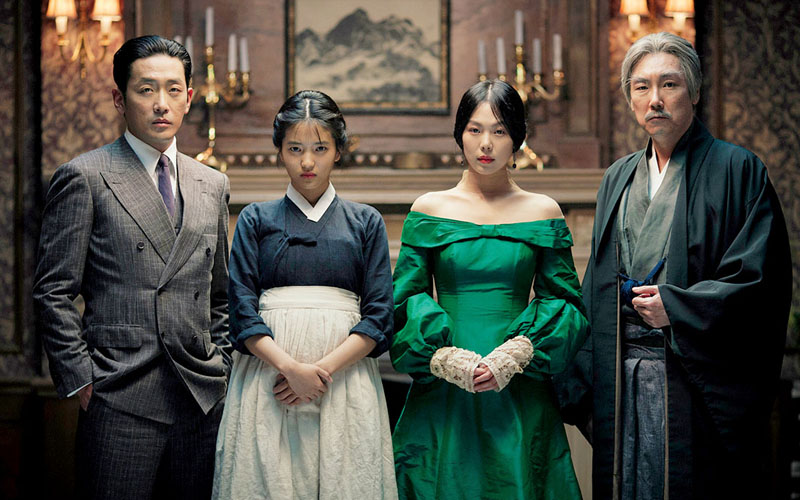
 The less you know about what happens in The Handmaiden
the more you'll likely find of interest, so for the purpose
of this review, my advice is to watch it knowing as little as possible
on what the story's all about, then come back and read this review.
Nevertheless, for those who are game, I will continue to strive, as I
do in all of my reviews, to not reveal any major plot spoilers that
would ruin your overall enjoyment of what is one of the better films
of 2016.
The less you know about what happens in The Handmaiden
the more you'll likely find of interest, so for the purpose
of this review, my advice is to watch it knowing as little as possible
on what the story's all about, then come back and read this review.
Nevertheless, for those who are game, I will continue to strive, as I
do in all of my reviews, to not reveal any major plot spoilers that
would ruin your overall enjoyment of what is one of the better films
of 2016.
The storyline involves the young handmaiden of the title, Sook-hee
(Tae-ri),
coming to the lush Japanese/Western-designed estate of the wealthy Kouziki
(Jo, Roaring Currents) to wait on the every
need of his physically and emotionally reclusive niece Lady Hideko
(Kim, Right Now Wrong Then),
who is slated to marry her uncle in due course. Sook-hee soon
discovers the sad Hireko to be a woman of many surprising attractions,
which makes her ulterior motives in taking the job, which is to grease
the wheels for a seduction of the heiress, originally planned out by
her colleague in the thieving industry, Count Fujiwara (Ha. The
Chaser), that will
bleed her dry of her pricey possessions over due course. As
passions begin to ignite, the more loyalties begin to be in question,
as the battle between desire for flesh and desire for money is
underway, leaving us wondering who has enough control over the
situations as they unfold to come out ahead in the end.
Park Chan-wook continues adding darkly funny, taboo-erotic and highly
disturbing thrillers to an already impressive filmography with The
Handmaiden, which adds a serpentine nature to its storyline that
ends up circling in on itself, until, like a boa constrictor, it
tightens down until everyone and everything caught within its grasp is
left gasping for precious life by the end of it. After one
English-language Hollywood film in Stoker, Chan-wook returns
to native South Korea for this fetish-tinged shell game, in Korean and
Japanese (during a time when the Japanese occupied Korea in the 1930s), despite being based on an English-language
Britain-in-the-Victorian-era novel of 2002 by Sarah Waters called "Fingersmith".
Although a lengthy 2 hours and 24 minutes in length, there is so much
to the plot of The Handmaiden, as well as so much artistry,
that it's nearly impossible to justify removal of any of it due to the
high quality of the sumptuously photographed filmmaking, even if you
could cite individual scenes that might have been tightened up, if
necessary. Although Chan-wook has pulled the rug out from under
us on a number of occasions in his prior works, none of his previous
entries are as layered in redirection and misdirection as The
Handmaiden, which continuously adds more to the story both on the
front end and the back end, jumping around in its timeline to reveal
even more to the plot and character motivations with each successive
reveal.
At its essence, the film reveals the same basic story but told through
a succession of points of view among the three main participants, each
revealing details to form a complete picture that could not be known
by all through their individual perspectives (shades of Rashomon
are no doubt deliberate, given the setting). The best of the
three "chapters" is the first, mostly due to the way that Chan-wook
builds up fine-tuned characterizations and sensuality in a way that
would work wonderfully even if The Handmaiden were a
straight-shot narrative all the way to the end. Motifs abound,
including the motherly position taken by orphan Sook-hee in caring for
her Lady, who is often compared to that of a little girl, putting
forth the reverse power play in their literal master-servant
relationship to fetishistic levels. Indeed, family dynamics are
in play for all of the major characters, who often tread the lines of
traditional family to include disturbing sexual interests -- a theme
that Chan-wook has virtually introduced in every film he has made to
date.
Other motifs of the film come from the contrasts between what it real
and what is a fraud, not only in terms of art pieces, but also
complete identities, as it seems everyone is playing more than one
role at various times throughout the narrative's course. The
fake is, of course, meant to trick those who aren't diligent about
having a discerning enough eye to spot the facade, which, in all
respects, leads to a downfall either monetarily, romantically, or even
in terms of ones livelihood, depending on how hard they fall for the
intended ruse. Lying, cheating, and stealing all have their
consequences, but sometimes that can be for the greater, depending on
whether a higher and more noble cause is put into play. Chan-wook
also shows that being up front about one's intentions also carries its
own rewards and punishments, as the lecherous uncle makes no bones
about his interests in seedy sexual practices, and his exploitation of
them has garnered him great wealth, but that also makes him a mark for
either thieves or those who want to exact a form of revenge on his
exploitative perversions of sexuality.
Park Chan-wook may not be a household name beyond cinephile circles,
but he is definitely a director that turns out must-watch material
with each release, at least for those who are able to take the lurid
sexual content and moments of sometimes grisly violence that
accompanies his stories of twisted characters and taboo developments.
What makes this one a cut above your typical suspenser is that Chan-wook
puts his characters and their individual stories above the gimmicky
plot structure, investing us in seeing how things will shake out for
all of them above and beyond just finding out who is left standing at
the end of the film. That it's also aesthetically beautiful amid
the sordid and often repugnant taint that coats the souls of the
characters within is but just one of many facets of Chan-wook's
continued showcasing of the deadly laws of attraction, that pleasure
can bring pain (and vice versa), that have ruined the lives and loves
of so many throughout the course of humanity's covetous existence.
Qwipster's rating:







©2016 Vince Leo

 The less you know about what happens in The Handmaiden
the more you'll likely find of interest, so for the purpose
of this review, my advice is to watch it knowing as little as possible
on what the story's all about, then come back and read this review.
Nevertheless, for those who are game, I will continue to strive, as I
do in all of my reviews, to not reveal any major plot spoilers that
would ruin your overall enjoyment of what is one of the better films
of 2016.
The less you know about what happens in The Handmaiden
the more you'll likely find of interest, so for the purpose
of this review, my advice is to watch it knowing as little as possible
on what the story's all about, then come back and read this review.
Nevertheless, for those who are game, I will continue to strive, as I
do in all of my reviews, to not reveal any major plot spoilers that
would ruin your overall enjoyment of what is one of the better films
of 2016.